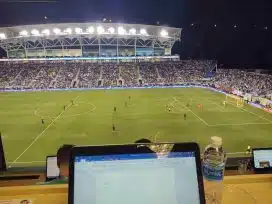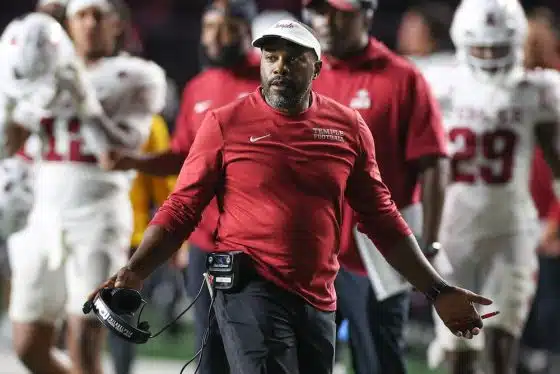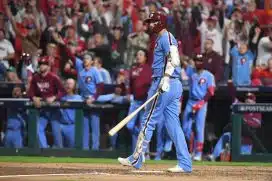Flyers
Flyers Bad Habits Finally Catching Up

After winning four of their first six games, the Flyers had a three-day break in the schedule. They picked up another win on the back of their netminder when they returned, then lost the next three games, two of them in overtime.
Leaning on your goaltending will only get you so far if you lack the overall talent and allow too many opportunities. That was the Flyers’ formula to a 6-3-2 start in the first 11 games of the season.
This past week of play started with a game against the reeling St. Louis Blues, mired in a seven-game losing streak entering Tuesday’s game. It turned into the Flyers most complete win of the season, getting the offensive production, the goaltending, and the overall better possession metrics.
The rest of the week also featured games against two more teams on long losing streaks, but bad puck management and penalties turned the narrative into something very different.
Against Columbus, poor play with the puck led to transition goals. By the early second period, they were in a 3-0 hole. While the effort was there and the team battled back to a 3-2 margin, that was as close as they would get in a 5-2 loss, capped by two empty-net goals for Columbus.
Entering Saturday’s game against Ottawa, the Flyers penalty kill was ranked fifth in the NHL. That was quickly dashed in both a 4-1 loss to the Senators, where the team was just 1-for-3 on the penalty kill, and on Sunday against Dallas, where they were 1-for-3 on the penalty kill in a 5-1 loss. The fourth goal against in Sunday’s game was a shorthanded goal for Dallas, one that came in the first minute of the third period when the Flyers had an opportunity to change the game.
Interestingly enough, in all three games that were regulation losses, the Flyers were the better team in terms of analytic numbers. They had better possession numbers, more shot attempts, more scoring chances, and more expected goals for than the opposition at 5-on-5.
After Saturday’s game, John Tortorella was frustrated with the Flyers taking “needless penalties” that provided the opportunity.
“You can’t win in the National Hockey League if you’ve got to play against two opponents. That’s the opponent themselves and us,” Tortorella said on Saturday. “We did so many good things, but then we self-implode with the penalties. Just unnecessary penalties. You can’t do it.
“You look at the penalties that they called, three on us, none on them. At the end of the night, it’s going to even out one way or another. You just can’t be doing it. They’re just needless penalties. We had the puck on two of them, to be honest with you, three of them. That changes the whole complexion of the game.”
Sunday’s game had followed a similar script, with the penalty kill struggling to keep the Flyers in the game and the power play surrendering a goal as well that essentially put the game away. As frustrating as the shorthanded goal allowed was to Tortorella, his message on Sunday was very different.
“I don’t look at it that way. I don’t think it’s the most lopsided. You guys look at the score and say holy s***. I don’t look at it that way. We put in a lot of good minutes. The thing that bothers me the most is the shorthanded goal. What if we scored that power play and it doesn’t go the other way? I think our effort’s there. There are a lot of good things going on with the team. Again, like I’ve told you before, I don’t look at the score. I have to coach the team on what’s going on. You can call it lopsided. I don’t look at it that way. There are things we have to improve. Special teams we’ve talked about, but if we keep our energy and our effort, we’ll figure some things out here.”
Part of the reason for Tortorella’s positive outlook in a lot of recent losses the Flyers have had is the effort put forward. While the Flyers have allowed the first goal of the game in 11 of 15 games this season, they have shown resilience to battle back. Following their win on Tuesday night against St. Louis, the team had a 7-3-2 record.
But the last three games, as good as they have been in effort and process, have shown various flaws. The team still struggles with puck management, which requires leaning on goaltending to bail out quality opportunities for the opposition. Special teams, both power-play production and penalty killing, have struggled of late.
A lack of high-end talent has also come into play. On Thursday, it was Johnny Gaudreau, who seemed highly interested in signing with Philadelphia in free agency, picking up three points against the Flyers. On Saturday, Alex DeBrincat, who was on the move via trade this past offseason, scored two goals. On Sunday, when the Flyers had six power-play opportunities, they had no finish.
As critical as goaltending is, it can only get you so far before a lack of scoring catches up with you. The Flyers got the goals they needed at the right time and were finding a way to win games on the back of such strong goaltending. Now they are losing games because the bad habits within their game and the lack of scoring talent is catching up to them in a hurry.
The benefit of the Flyers 7-3-2 start is that it provided some cushion for making a statement to start the season. They could just as easily impress over the next week and make this three-game skid a blip on the radar in the course of an 82-game season. They could also fall back into the region of the standings where everyone envisioned they would be. It is a fine line between being inside the playoff picture and being at the bottom of the standings.












































